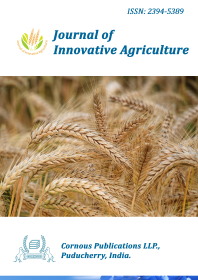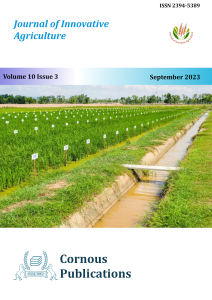
Journal of Innovative Agriculture
Peer Reviewed Open Access Journal
ISSN: 2394-5389 NAAS Rate: 4.05
Submit Manuscript
Peer Reviewed Open Access Journal
ISSN: 2394-5389 NAAS Rate: 4.05
Submit ManuscriptIdentifying the current farming system is important for different agricultural policy implementation as climate variability changed the farming system in the study area. Hence, this study aimed to analyze the current farming system of crop-livestock and agro-pastoral areas in the south omo zone. A multistage sampling method was used to select 240 sample respondents from the study districts. Descriptive statistics and narrative approaches were used to analyze data. The result indicated that there was a dominance of crop production (63.3%) and supportive livestock production (36.7%) in crop-livestock farming system whereas in agro pastoral farming livestock dominates (72.5%) with supportive crop production (27.5%). The result also indicated that the main livestock production constraints for farmers and agro-pastorals in the area are extensive drought and erratic rainfall, diseases, shortage of veterinary medicine, feed and water shortage. Moreover, the survey result shows that poor soil fertility management, low inputs use, pests (diseases and insects), delay of input supply and high costs are the main impediments in crop production for farmers and agro-pastorals in the area. The major constraints of natural resources in the study are soil fertility decline, land shortage due to fragmentation of land for their children and deforestation. Therefore, it needs more attention to reverse the mentioned major constraints so as to enhance production and productivity. Timely supply of improved inputs, improved forage, methods of disease control and intensifying natural resource management and creating better awareness on physical and biological soil management are critical for improvements of soil to enhance productivity.
agro-pastoral, crop, farmers, farming system, livestock
Aldow, A. M. (2017). Factors affecting sweet potato production in crop–livestock farming systems in Ethiopia (Master’s thesis). Norwegian University of Life Sciences.
Demese, C., Berhanu, A., & John, M. (2010). Ethiopia’s agricultural sector policy and investment framework: Ten-year roadmap (2010–2020). Ministry of Agriculture and Rural Development.
Dixon, J., Gulliver, A., & Gibbon, D. (2001). Farming systems and poverty: Improving farmers’ livelihoods in a changing world. Food and Agriculture Organization of the United Nations & World Bank Group.
Emana, B., Afari-Sefa, V., Dinssa, F., Ayana, A., Balemi, T., & Temesgen, M. (2015). Characterization and assessment of vegetable production and marketing systems in the humid tropics of Ethiopia. Quarterly Journal of International Agriculture, 54(2), 163–187.
Farauta, B. K., Egbule, C. I., Idrisa, Y. L., & Agu, V. C. (2011). Perception of climate change and adaptation strategies in Northern Nigeria: An empirical assessment. Journal of Agricultural Extension, 15(2), 1–12.
Ikehi, M. E., Onu, F. M., Ifeanyieze, F. O., & Paradang, S. P. (2014). Farming families and climate change issues in Niger Delta region of Nigeria: Extent of impact and adaptation strategies. Journal of Agricultural Sciences, 5(12), 1140–1151.
International Food Policy Research Institute. (2009). A study in support of the MarsFood action of the European Union: The cereal availability in Ethiopia, 2007/08 (Final technical report submitted to the European Commission Joint Research Centre, Institute for the Protection and the Security of the Citizen). IFPRI.
Lelago, A., Mamo, T., Haile, W., & Shiferaw, H. (2016). Characterization of farming systems in Kedida Gamela, Kacha Bira and Damboya woredas (administrative districts) in southern Ethiopia. Journal of Biology, Agriculture and Healthcare, 6(9), 102–116.
Roberts, C., & Azzarri, C. (2014). Ethiopia agricultural snapshot 2011/12 (Working paper). HarvestChoice, International Food Policy Research Institute.
Taffesse, A. S., Dorosh, P., & Gemessa, S. A. (2012). Crop production in Ethiopia: Regional patterns and trends. In Food and agriculture in Ethiopia: Progress and policy challenges (pp. 53–74). University of Pennsylvania Press.
Zerssa, G., Feyssa, D., Kim, D. G., & Eichler-Löbermann, B. (2021). Challenges of smallholder farming in Ethiopia and opportunities by adopting climate-smart agriculture. Agriculture, 11(3), 192.
